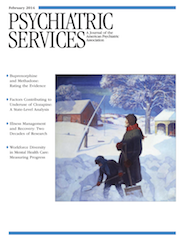Association of Empathy of Nursing Staff With Reduction of Seclusion and Restraint in Psychiatric Inpatient Care
Abstract
Objective
Disruptive behavior leading to seclusion or restraint increases with patients in a high-acuity stage of mental illness who have histories of aggressive behavior. The study examined whether greater nursing staff empathy skills and motivation reduced use of seclusion and restraint and whether empathy training can further this effect.
Methods
In 1,098 nursing shifts in 2 six-month periods one year apart, hierarchical analyses examined the effects of nursing shift and patient characteristics, the effect for each shift of nurses' skill and motivation to use empathy, and whether empathy training reduced use of seclusion and restraint.
Results
With controls for shift, patient, and other staffing variables, analyses showed that the presence of more nursing staff with above-average empathy ratings was strongly associated with reduced use of seclusion and restraint but empathy training showed no further benefit.
Conclusions
Recruiting and retaining empathic nursing staff may be the best way to reduce the use of seclusion and restraint.



